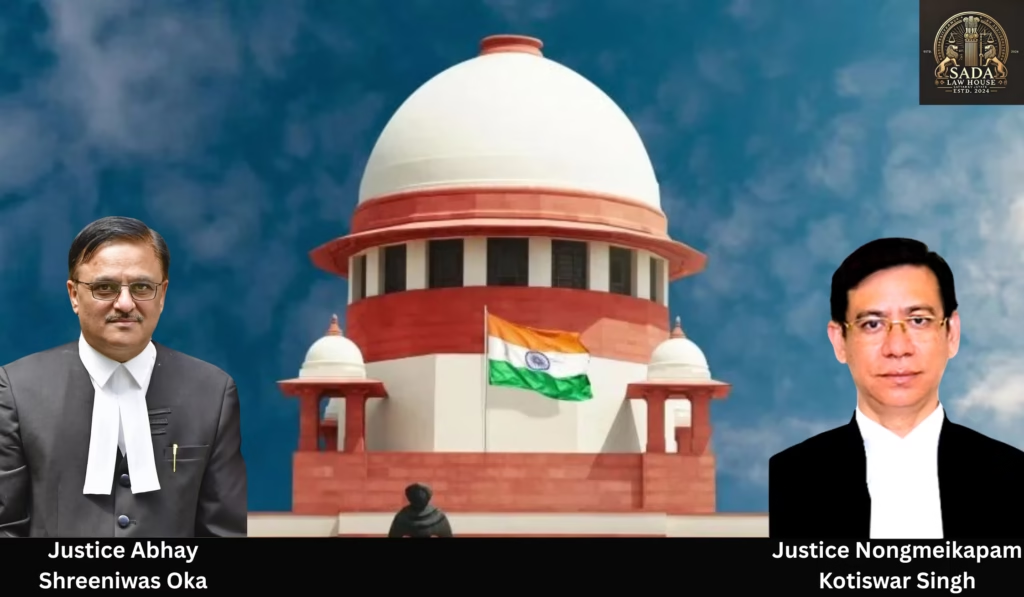Supreme Court Mandates Cashless Treatment for Road Accident Victims in Landmark 2025 Ruling: S. Rajaseekaran v. Union of India
Trending Today Supreme Court Mandates Cashless Treatment for Road Accident Victims in Landmark 2025 Ruling: S. Rajaseekaran v. Union of India Supreme Court on Unlawful Arrest: Vihaan Kumar Case and the Right to Be Informed of Grounds of Arrest Adultery and the Armed Forces: Applicability of the Joseph Shine Verdict Post-Decriminalization Steps to Protect the Great Indian Bustard: Insights from the Supreme Court’s Landmark Judgment Supreme Court’s Landmark Ruling on Nationality Under the Foreigners Act, 1946 – Md. Rahim Ali vs. State of Assam (2024) Supreme Court’s Landmark Judgment: States’ Power to Sub-Classify Scheduled Castes for Reservations Pakistan’s War Readiness in Crisis: Artillery Shortage Limits Combat Capability to Four Days Supreme Court’s Power to Grant Divorce Under Article 142: Shilpa Sailesh v. Varun Sreenivasan Judgment AIMPLB Challenges WAQF Amendment Act 2025: Supreme Court Affidavit Highlights Risks of De-registration Supreme Court: Bribery Conviction Under PC Act Requires Proof of Demand Beyond Recovery of Tainted Notes Supreme Court Mandates Cashless Treatment for Road Accident Victims in Landmark 2025 Ruling: S. Rajaseekaran v. Union of India NITU KUMARI 06 May 2025 Introduction The landmark case of S. Rajaseekaran v. Union of India & Ors. brought to light the critical need for a robust system to provide timely medical aid to road accident victims in India. This case underscores the significance of the “golden hour“—the crucial first hour following an accident—in saving lives. Facts of the Case The petitioner, Dr. S. Rajaseekaran, filed a writ petition highlighting the lack of a concrete mechanism to enforce Section 162 of the Motor Vehicles Act, 1988. This section, introduced in April 2022, mandates cashless treatment for traffic accident victims during the golden hour. Despite the legal framework, the Government of India had not implemented a functioning scheme, necessitating judicial intervention. The Court emphasized that delaying medical aid violates Article 21 of the Constitution of India, which guarantees the right to life. Additionally, the Motor Vehicle Accident Fund under Section 164-B remained underutilized due to a lack of planning. Issues Before the Court Has the Central Government fulfilled its legal duty under Section 162 by creating a cashless treatment scheme for accident victims? Does the draft concept note meet the practical and financial requirements of the golden hour scheme? Is the Motor Vehicle Accident Fund being effectively utilized as per Section 164-B? Are delays in hit-and-run compensation due to procedural or documentation shortcomings? Has the General Insurance Corporation of India (GIC) made sufficient progress in building a digital claims portal? Judgment Summary On January 8, 2025, a bench led by Justice Abhay S. Oka and Justice Augustine George Masih delivered a pathbreaking judgment: Government Obligations The Central Government must frame a comprehensive scheme for cashless golden hour treatment by March 14, 2025. GIC Responsibilities The GIC is directed to address pending hit-and-run claims based on a list of seven required documents. It must also develop a digital portal for streamlined claim processing and report progress by the same date. Key Observations Golden Hour Criticality: Reinforced the definition and importance of the golden hour under Section 2(12-A). Constitutional Duty: Reiterated that failure to provide timely medical aid violates Article 21. Statutory Compliance: Emphasized the binding nature of Sections 162 and 164-B. Future Implications This judgment is expected to: Enhance emergency medical response capabilities across India. Enable faster, transparent, and simplified insurance claim settlements through digital platforms. Set a precedent for judicial enforcement of public safety laws. Conclusion The Supreme Court’s ruling in S. Rajaseekaran v. Union of India & Ors. marks a significant move toward implementing a life-saving policy framework. It bridges the gap between legislative intent and actual execution, reinforcing the judiciary’s role in safeguarding constitutional rights and promoting public welfare through a cashless treatment scheme for road accident victims. Case Citation: 2025 INSC 37 Date of Judgment: January 8, 2025 Court: Supreme Court of India Leave a Reply Cancel Reply Logged in as Sada Law. Edit your profile. Log out? Required fields are marked * Message* Case Laws Supreme Court Mandates Cashless Treatment for Road Accident Victims in Landmark 2025 Ruling: S. Rajaseekaran v. Union of India Supreme Court Mandates Cashless Treatment for Road Accident Victims in Landmark 2025 Ruling: S. Rajaseekaran v. Union of India Sada Law • May 6, 2025 • Case law • No Comments Supreme Court on Unlawful Arrest: Vihaan Kumar Case and the Right to Be Informed of Grounds of Arrest Supreme Court on Unlawful Arrest: Vihaan Kumar Case and the Right to Be Informed of Grounds of Arrest Sada Law • May 6, 2025 • Case law • No Comments Adultery and the Armed Forces: Applicability of the Joseph Shine Verdict Post-Decriminalization Adultery and the Armed Forces: Applicability of the Joseph Shine Verdict Post-Decriminalization Sada Law • May 6, 2025 • Case law • No Comments 1 2 3 … 5 Next »








